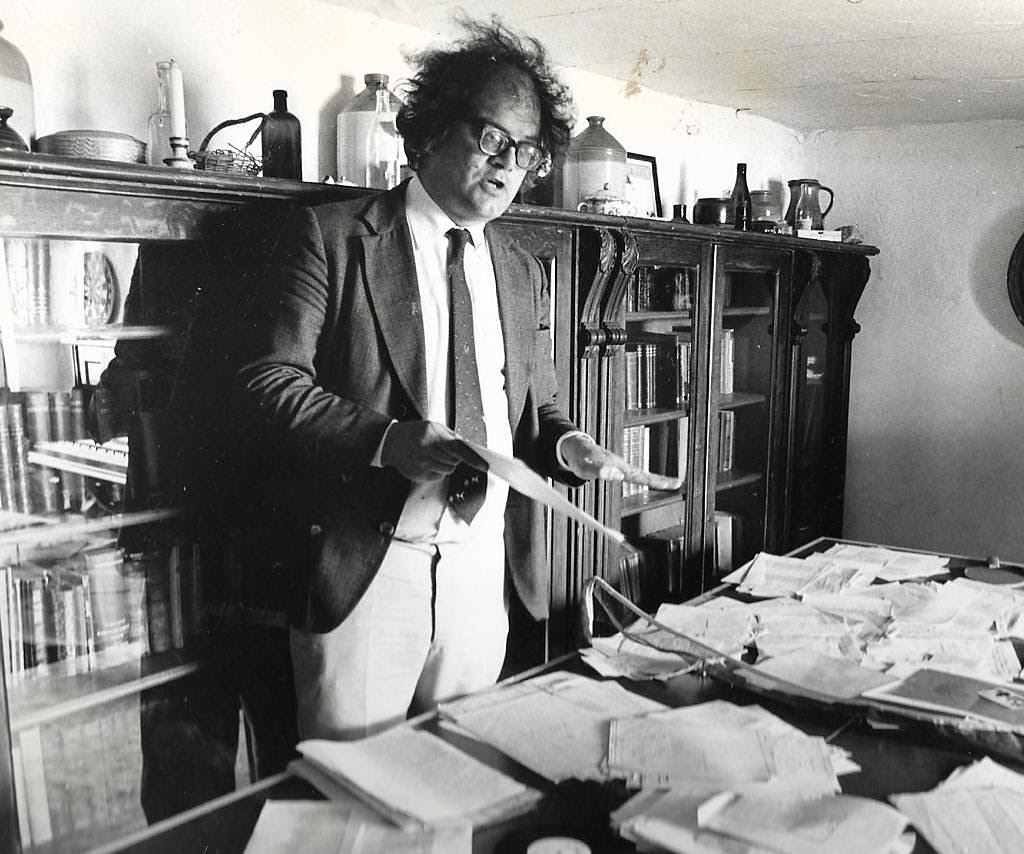My father would have put big red marks on this obituary for him by Stephen Nash for the Anglo Albanian Association, where it is suggested that Shipston is in Worcestershire rather than Warwickshire. Otherwise he would have been rather touched by what follows as were myself and my siblings. But Dad wouldn’t have said so. Folks of his generation did not admit to such things. Maybe he might have chosen a rather less “mad professorish” photo.
5 April 1938 – 12 October 2020
|
It was a truism that Tom Winnifrith was a larger-than-life figure who made an immediate impression on one. This impression was wholeheartedly positive: you could not ignore Tom. His size – a bear of a man – would make this difficult, as would his natural gift of conviviality and engaging with people of all ages and origins.
I was fortunate to get to know him when my time in Nicaragua was drawing to a close in the late ‘80s. A good friend of ours had taken up a job teaching Latin American history at the University of Warwick, where Tom had moved in 1970 to teach English and comparative literary studies, and where he later set up a very successful Classics department. We made regular visits to Leamington Spa where Tom and family eventually moved.
But our paths crossed more frequently when I finally put up my hand, having heard that the Office was looking for a new Chargé d’Affaires for our Embassy in Tirana. Knowing nothing about Albania and not a word of the language, I felt I was the man for the job. I first arrived in Tirana in 1993. Tom by this time had also come under Albania’s spell for a very specific reason. After studying “Greats” ie Classics at Christ Church, Oxford, he took teaching posts first at Emanuel School in Battersea and then for six years at Eton. It was during this period that he became fascinated by the Vlach language, still spoken in parts of the Balkans and said to be the closest to Latin of any living tongue.
He was determined to immerse himself in the culture, language and history of the Vlachs and eventually in 1995 his book “The Vlachs: The History of a Balkan People” (published by Duckworth) appeared after many field excursions by Tom into the mountainous, Vlach-inhabited regions of southern Albania. We were reminded of this in a recent tribute to Tom, which featured the photographs of Lala Meredith-Vula, where we saw him wearing a shirt and tie under the Balkan sun, no doubt out of respect for a local Vlach leader he was about to meet.
His sense of humour did not leave him even when traipsing through remote areas where comfort was not always assured at the end of the day. In Albania, having a sense of humour can be a necessary part of one’s defensive armour: Tom was partial to Wodehousian games of cricket played by Englishmen on Albanian soil: the first one took place in 1976 during the Enver Hoxha era when the cricketers were keenly watched by ever-present minders. It was played spontaneously in Ballsh, to the south of Fier, where the tourist bus had broken down.
Two years ago, Tom, who was already terminally ill, bravely sent us a short, whimsical article on “Cricket in Albania” which appeared in our Summer 2019 edition. In this gem of a piece, Tom recounts that in this 1976 match, held on a football pitch, the “Byzantinists” beat the “Bankers” by 37 runs to 28. 20 years later a repeat match was played but this time the Butrint Foundation offered a level pitch within the archaeological site area: Tom saw to it that the cricketers were properly armed with bats, bails and blazers, but the impact of 20 years of yomping in the Albanian mountains meant that he himself did not feel like going to the crease. Like an epitaph, his essay on cricket in Albania ends simply with what he described as a “dull and incomprehensible” truth: “I am a student of the Vlachs”.
I was glad to have been able to persuade Tom and his wife Helen to accept invitations to participate in English Study Weeks which I arranged in Tbilisi, Tirana and Riga. As Georgian undergraduate students of English assured me, no teacher was better than Tom Winnifrith at bringing the Brontës and Jane Austen to life; in Tirana, Tom enjoyed the comedy of hearing his friend Professor Anthony Bryer, the eminent Byzantinist, reciting Edward Lear’s The Courtship of the Yonghy-Bonghy-Bo in the British Council offices. At the Embassy in Riga, Tom’s wife Helen regaled us with an account of the mission of her grandfather, Sir Hughe Knatchbull-Hugessen, who was sent by the Foreign Office to Riga, as Minister to the three Baltic States from 1930-34: he famously complained in a poem, “Quicunque Balt”, at having had only “one salary, not three salaries”.
Tom was a serious historian and commentator on international affairs, Albanian affairs in particular. It was only a few months before he died that he managed – with the friendly persuasion of James Pettifer – to finish off his final book on Albania, “Nobody’s Kingdom: A History of Northern Albania” (Signal Books, 2020). His book on the South, “Badlands – Borderlands: A History of Southern Albania/ Northern Epirus”, had appeared earlier (Duckworth, 2002).
One exercise in political soul-searching which I would also recommend was Tom’s essay entitled “A Betrayal Betrayed: Kim Philby and Albania”. In this work, published in “Albania and the Balkans: Essays in Honour of Sir Reginald Hibbert” (2013, Elbow Publishing), Tom tries to unpick the argumentation for and against laying the betrayal of the agents sent into Albania after the War at Philby’s door. His judgement is in the end inconclusive but he inclines to the view that it was conjecture rather than hard evidence which led to the blaming of Philby. Tom cites recent official histories of MI5 and MI6, which are quick to name Philby as a traitor but reluctant to blame him for treachery in Albania. As Tom says more than once “This paper holds no brief for Philby”, but when he addressed an Anglo-Albanian Association audience at the London School of Economics, he had to use all his powers of persuasion to put his views across. Tom’s children attest to the fact that he could be a stern father when questions of truth and evidence were at stake.
I managed to visit Tom on several occasions during the last years of his life. It was during one such visit that an extraordinary event took place in the quiet Worcestershire town – Shipston-upon-Stour – where he lived. Just at the bottom of Sheep Street, there was a ram raid on the local Co-op store the night before I arrived, and there was an uneasiness in the air and debris in the streets. Tom was dismissive of the event, which was for him simply another illustration of human greed.
Tom – a devout Christian – had one word for describing the Internet and all that therein is, – “Beelzebub”, and nothing would shake him from this. But, fortunately for us, his children decided that the wonderful service of thanksgiving for his life, held in St Edmund’s Church in Shipston-upon-Stour on 29 October 2020, should be brought to the homes of kith and kin via Zoom.
Stephen Nash
February 2021



